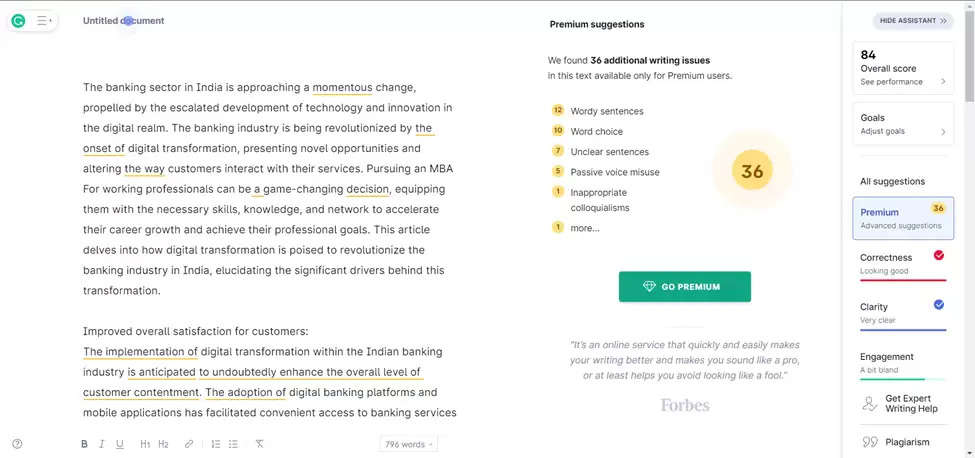From Branches to Bytes: How Digital Transformation is Shaping Banking in India
The banking sector in India is approaching a momentous change, propelled by the escalated development of technology and innovation in the digital realm. The banking industry is being revolutionized by the onset of digital transformation, presenting novel opportunities and altering the way customers interact with their services. Pursuing an MBA for working professionals can be game-changing, equipping them with the necessary skills, knowledge, and network to accelerate their career growth and achieve their professional goals. This article delves into how digital transformation is poised to revolutionize the banking industry in India, elucidating the significant drivers behind this transformation.
- Improved overall satisfaction for customers:
The implementation of digital transformation within the Indian banking industry is anticipated to undoubtedly enhance the overall level of customer contentment. The adoption of digital banking platforms and mobile applications has facilitated convenient access to banking services for customers, regardless of place and time, thus obviating the necessity for physical branch visits and protracted waiting periods. The implementation of instant fund transfers, online account management, and personalized interactions facilitated by Chabot are notable features that culminate in enriching customers' banking experience with increased levels of convenience, speed, and efficacy. Digital transformation has the potential to streamline and enhance transactions through the utilization of digital payment systems, thereby decreasing dependence on traditional forms of currency and promoting greater transparency. The utilization of data analytics by financial institutions opens up the possibility of delivering tailor-made financial solutions that are geared towards fulfilling the specific requirements and inclinations of individual clients. Broadly speaking, digital transformation can augment the banking industry's customer experience by conferring improved convenience, accessibility, and customer-centricity. As a result, customer satisfaction levels may be expected to improve.
- Shift towards Cashless Economy:
The banking industry's digital transformation is expediting the move towards a society devoid of physical currency in India. The adoption of digital payment methods like UPI, mobile wallets, and contactless payment options has transformed the conventional mode of carrying out transactions. Due to the ease and safety provided by electronic transactions, people and corporations are progressively embracing non-cash modes of payment. This trend aims to enhance financial inclusivity by granting wider demographic access to banking facilities while concurrently decreasing dependence on tangible currency, all in a bid to instill greater honesty, productivity, and responsibility in the banking industry. The future of banking in India is being revolutionized by digital transformation, which is facilitating the shift towards a cashless economy, supporting economic development, and revolutionizing how transactions are executed.
- Data-driven Decision Making:
Digital transformation enables banks to utilize the potential of data to improve their decision-making process. As digital transactions become more prevalent, banks have the opportunity to amass extensive customer data. Analyzing this information yields important intelligence regarding customers' behavior, predilections, and requirements. Banks can utilize sophisticated analytics and AI to provide custom financial solutions and services, customize their marketing tactics, and effectively manage risks. By using data to make decisions, banks can also improve their ability to detect and prevent fraudulent activities, which ultimately creates a more secure banking environment.
- Agile and Innovative Banking Solutions:
The adoption of digital transformation enables the development of flexible and inventive banking solutions. Banks are making use of innovative technologies like blockchain, IoT, and cloud computing to improve efficiency, cut down expenses, and fortify security. Smart technologies facilitate expedited loan processing, effortless account establishment, and elevated risk mitigation. Moreover, by forming collaboration and partnership agreements with fintech startups, banks can access cutting-edge solutions and cultivate a transformative and adaptable outlook within the banking industry.
- Financial Inclusion and Rural Banking:
Digital modernization has a vital part in advancing the practice of financial inclusion, particularly in the less urbanized areas of India. People in far-flung areas can now avail themselves of fundamental banking amenities, such as account openings, money transfers, and loan facilities, thanks to the introduction of digital banking solutions and mobile banking applications. Advanced tools such as biometrics and the integration of Aadhaar provide a safe and efficient means of identification, streamlining banking for those without previous access to such services.
The emergence of digital transformation can bring about a remarkable shift in the banking industry of India, offering numerous prospects for upgraded customer satisfaction, encouraging the use of electronic payments, facilitating informed decision-making, delivering flexible banking solutions, and stimulating the process of incorporating financially excluded individuals. Banks must embrace digital transformation to stay relevant, competitive, and meet changing customer preferences, as technology continues to advance. The banking sector in India is moving towards a more inclusive, efficient, and accessible future with the help of digital advancements. Nowadays, many colleges offer online mba for working professional courses for all types of individuals, which can indeed become an excellent opportunity for anyone to increase their skills in this field.






